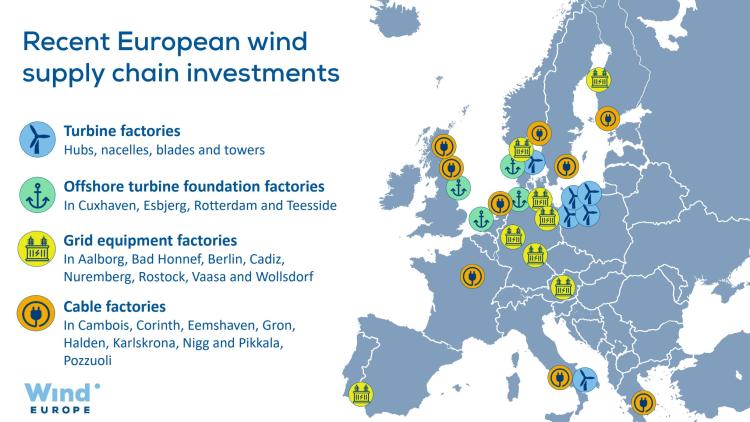Last October the European Commission published its Wind Power Package which outlines 15 immediate actions to strengthen the competitiveness of Europe's wind supply chain. The European Commission and the European Investment Bank (EIB) are delivering on this. Most actions fall to the individual EU Member States which have made some progress. As a result, Europe's wind supply chain is starting to ramp-up. But more efforts are needed to meet the EU's ambitious energy targets.
The EU wants European wind farms to be built using turbines that are made in Europe. The Net Zero Industry Act requires 36 GW of wind energy manufacturing capacity in the EU by 2030. To achieve this, we must urgently strengthen the competitiveness of Europe's wind industry or risk not being able to produce the volumes of wind turbines that Europe needs.
The supply chain is playing their part with new investments announced right across Europe. For example, wind turbine manufacturer Vestas will set up a new nacelle and a new blade factory in Szczecin, Poland. Taken together, the two factories could create more than 1,700 direct jobs by 2026. And Siemens Energy plans to hire around 4,000 new employees in Europe to step up its grid equipment manufacturing capacity. And there are many more investments - as shown on our map below.

The European institutions are also delivering on their action points. Last year the European Commission launched a 4bn call under the Innovation Fund with grants aimed at supporting investment in Europe's clean tech manufacturing industry. Additionally, European Commission President Ursula Von der Leyen recently announced a European Competitiveness Fund' which aims to boost clean tech financing by leveraging and de-risking private investment.
The European Investment Bank (EIB) is also playing a major role. As a key measure of the Wind Power Package, it has set up a 5bn counter guarantee facility to boost wind supply chain investments. On 31 July the EIB activated the first tranche of its counter guarantee facility through reaching a 500m counter-guarantee deal with Germany's Deutsche Bank. The agreement is part of a 1bn portfolio of counter-guarantees that Deutsche Bank will use to bolster the wind industry, including investments in wind farms. The EIB estimates that this will trigger additional private investments of up to 8bn.
The EIB has also provided a 450m loan to cable manufacturer Prysmian. The company will use the loan to double its production capacity for extruded cables at its three factories in Pikkala, Finland; Pozzuoli, Italy and Gron, France. This is a crucial expansion to meet the offshore wind industry's growing cable demand. And the EIB has just signed a 35m loan with Spanish wind component manufacturer Haizea to support the company in implementing advanced manufacturing technologies for the assembly of large metal structures used in wind farms.
With investments being made in the European supply chain, the focus must now turn to ensuring fair competition and a level playing field. Chinese wind turbines are being offered in Europe for 30 - 50% less than European turbines on deferred payment terms of up to 3 years. The latter cannot be offered by European manufacturers under OECD rules. Overall this practice contradicts the World Trade Organisation's rules-based system for global trade, particularly regarding the need for governments to maintain transparent trade policies.
"We are finally seeing financial instruments being put in place to support the European wind manufacturers. However, the wind supply chain remains under threat from an increasingly unfair level of competition from outside Europe" said Phil Cole, Director of Industrial Affairs. "This creates additional risks and sends the wrong market signals to investors - we need to get ahead of this issue quickly. We've seen similar market entry strategies from China decimate other European manufacturing industries. It poses a significant risk to jobs, prosperity and Europe's energy security".
To address these issues, the European Commission has launched an inquiry into the supply of Chinese turbines under the Foreign Subsidies Regulation and President Ursula von der Leyen has announced that she intends to launch a new Clean Industrial Deal within the first 100 days of her second term. We must ensure that self-imposed red tape does not get in the way of Europe's clean tech industries continuing to be a global success story.
26 EU Member States committed to implementing the Wind Power Package by endorsing the European Wind Charter. Their main actions include improving auction design and permitting as well as further supporting infrastructure investments. They are increasingly implementing their commitments. Permitting numbers are up in Belgium, France, Germany, Greece and Spain thanks to legal changes. And in Austria, France, Ireland and Italy regulators have indexed their auction prices to account for heightened input prices the wind industry has been struggling with. Member States must continue to implement the Wind Power Package actions to ensure manufacturing capacity and energy security targets are met.
New supply chain campaign
WindEurope will highlight the benefits of the European wind supply chain in a dedicated campaign starting soon. Our representatives will visit sites across Europe to profile the excellent work of the European industry and share their insights on social media.









